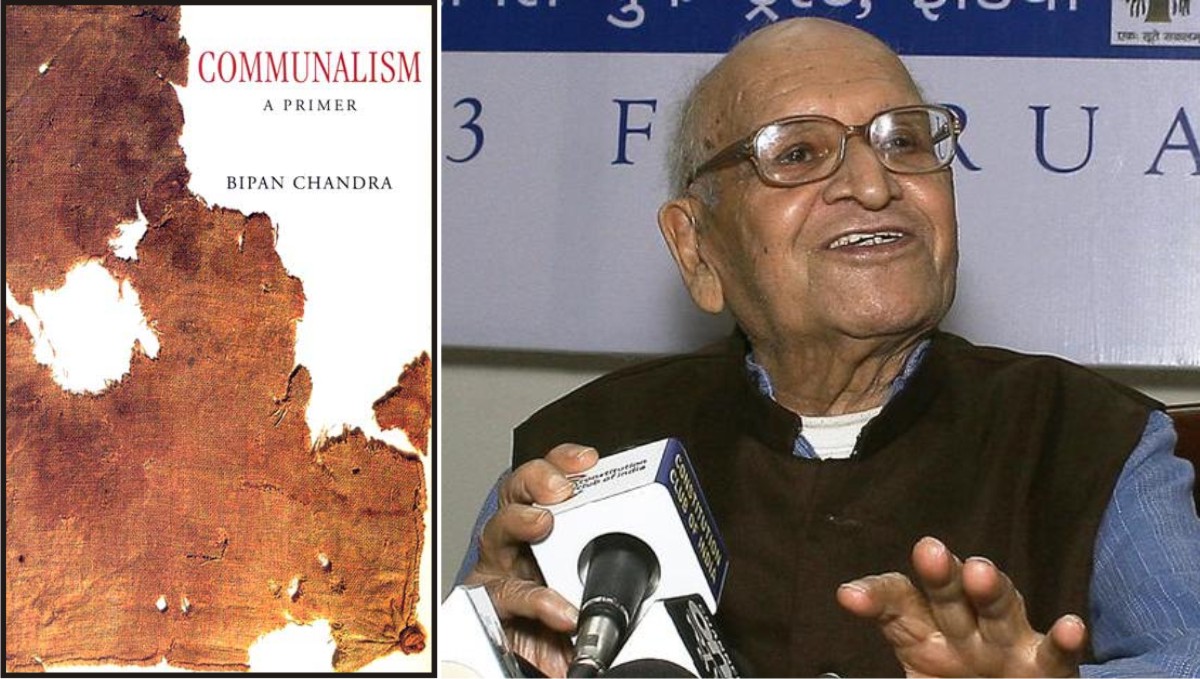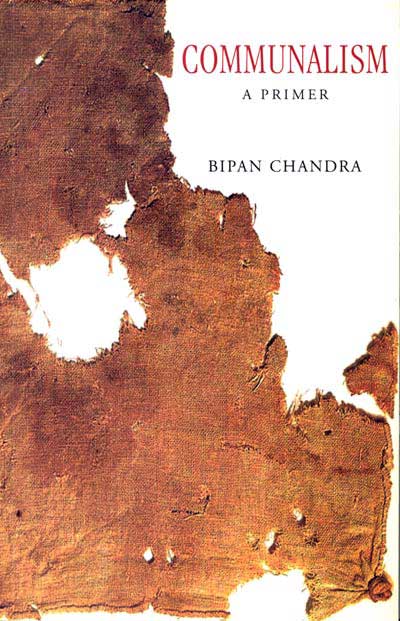
News of the widely read book, Communalism-A Primer, by eminent historian Bipan Chandra being summarily discontinued from the wide repertoire of the National Book Trust have invited widespread criticism.
It is the latest in a long line of attempts to limit history and social studies teaching, bringing it within the narrow ambit of a majoritarian and authoritarian wordview espoused by the Rashtriya Swayamsevak Sangh.
What does this book, printed and re-printed in several editions contain that is so worrisome to the mind-controlling agenda of the current regime.
Sabrangindia brings it’s readers excerpts from the book that was clear and scathing about all forms of communalism.
Excerpts:
Indian National Movement, Secularism and Communalism
I. India’s movement for freedom was based on a common vision of nation-building and commitment to nationalism, national unity and national development and a strong and united Indian nation based on a democratic and civil libertarian order, with emphasis on freedom of thought and expression. The belief was that only democracy could unite and hold together a vast and diverse country like India. Translated in economic terms independence depended on economic and social strength. The national movement was committed to rapid economic development along modern lines, to the removal of poverty and inequality, and to social change and social justice.
The social vision of the national movement encompassed a secular state and a secular and plural society so far as culture, religion and language were concerned. The leaders of the movement fully understood and maintained that Indian nationalism had to be based on sturdy secularism. The founders of the Indian Republic fully realized that a modern, strong and united India could not be built except on secular foundations. Facing frontally the challenge of communalism to nation-making, secularism was one issue on which they would make no compromise.
The heritage of this secular vision is an important aspect of the struggle against communalism. This heritage was so strong that despite the communal killings of the partition riots, despite the coming of millions of refugees who had lost their all in Pakistan, despite the resurgence of communal feelings in large parts of the country during 1946-47, we were able to contain communalism. Though the country was partitioned because we could not rout communalism, which was successful in partitioning our country, still, we managed to create a secular state and society and give ourselves a secular Constitution.
Gandhi in 1940: ‘If religion is allowed to be as it is, a personal concern and a matter between God and Man.’
It is very interesting that the Indian national movement, especially from the 1880s onwards when the Indian National Congress was founded, never took up a religious issue for agitation except for the Khilafat issue during 1920-1922, that too it did because it was at the time, an anti-imperialist issue and part of Gandhiji’s efforts to unite Hindus and Muslims in the struggle for national liberation. It never repeated the experiment. It also did not, especially after 1918, use religion in the ideological definition of nationalism or of its programme. Nor did it ever criticize the British rule because the British were Christians or describe the British rule as Christian rule. Not once was it said that the British rule should go because it was Christian. It was opposed because of its economic, political, psychological and cultural domination of the Indian people.
As a broad, all encompassing movement, the national movement accommodated in it various ideological strands from the conservatives to the leftists. During the 1920s, it even admitted communalists into its ranks so long as they accepted the objectives of Hindu-Muslim unity, the reality of the composite Indian culture, did not preach communal hatred and participated in the united struggle against colonialism.
But once the communalists, Hindu or Muslim, talked of communal separatism, of Hindu nation and Muslim nation, preached hatred against the followers of other religions, refused to cooperated in the struggle against colonialism and even tried to disrupt it and, in practice, cooperated with colonial authorities, the movement turned against the communalists, to whichever religion they might belong. In 1938 the Indian National Congress, under the presidentship of Subhas Chandra Bose, debarred members of the Hindu Mahasabha and the Muslim League from holding any office in the Congress from the lowest village branch upwards.
The Indian national movement defined secularism in the same comprehensive manner as discussed in Section I above: The state must be neutral towards all religious faiths or, as religious persons put it, the state must show equal regard for all faiths including atheism; the state must not discriminate in favour of or against any citizen on grounds of his or her religion; and communalism of every variety must be clearly and firmly opposed. Above all, religion must be separated from politics, economy and education and treated as a private or personal affair.
In this respect, some people mistakenly hold that Gandhiji’s understanding of secularism was very different. This is not true. Gandhiji too defined, and ‘lived’ secularism in the same manner as the national movement as a whole. That Gandhiji was totally opposed to communalism and that was Nathuram Godse killed him is well-known. Also well-known is his belief that a person should have the right to pursue his or her religion and not face any discrimination on the grounds of religion and that all persons should show equal regard for all religions including atheism.
It is, however, because of Gandhiji’s oft-repeated formulation that politics could not be divorced for religion – from example, his statement in his Autobiography or The Story of My Experiments with Truth, in 1925 – that many assert that the definition of secularism as separation of religion from politics was not acceptable to Gandhiji. But a gross misunderstanding as well as ignorance of Gandhiji’s views is involved here. Gandhiji was a deeply religious person and a very moral being.
Gandhi In 1942: ‘Religion is a personal matter which should have no place in politics’. In 1947: ‘Religion is the personal affair of each individual, it must not be mixed up with politics or national affairs.’
He used the word ‘religion’ in two different senses: one in its denominational sense, that is in terms of Hinduism, Islam, Christianity, etc., and the other in the sense of belief in God and Truth and the traditional concept of Dharma – the moral code which guided a person’s life. In asserting that politics should be based on religion, he did not mean it should be based on Hinduism, Islam, etc., but that it should be based on morality and ethics, that is Dharma– and religion was to him the fountainhead of morality. But he also repeatedly asserted that ‘the fundamental ethics is common to all religions’ and urged: ‘Do not mix up religion and ethics’. It was in part to emphasize this commonness that he changed his earlier formulation ‘God is Truth’ to ‘Truth is God’.
But later, in the late 1930s and 1940s, when he saw that the communalists, both Hindu and Muslim communalists, were using religion in the organized, denominational and doctrinal form to divide the Indian people politically, to promote communal strife and hatred against followers of other religions, to propagate theories of ‘Hindu Nation’ and ‘Muslim Nation’, and to demand religion-based states, he completely changed his formulation regarding the relationship between religion and politics.
He now asserted that religion, in the sense of Hinduism, Islam, etc., and politics should be kept separate, that religion must not be brought into politics and public sphere, and that it must be treated as a private affair of the individual. He said this not once, but tens of times, day after day, in his evening prayer meetings and in his weekly Harijan from 1940 till the day of his death. Some of his exhortations are recorded in his Collected Works.
Thus, he said in 1940: ‘If religion is allowed to be as it is, a personal concern and a matter between God and Man.’ In 1942: ‘Religion is a personal matter which should have no place in politics’. In 1947: ‘Religion is the personal affair of each individual, it must not be mixed up with politics or national affairs.’ Also in 1947, he asserted: ‘The state is bound to be wholly secular.’ In 1946, he told a missionary: ‘If I were a dictator, religion and state would be separate. I swear by my religion. I will die for it. It is my personal affair. The state has nothing to do with it.’
One weakness of the national movement in its struggle against communalism was the relative absence of a mass ideological campaign against it and for the spread of a secular outlook. The result was that the communal forces were not fully contained, they remained a running sore in the Indian polity, and even succeeded in partitioning the country.
Even so, as pointed out earlier, it was one of the great triumphs of the Indian national movement that independent India succeeded in framing a secular Constitution and laying the foundations of a secular state and society despite the partition and the resurgence of communalism during 1946-47.
That major leaders of the national movement were fully committed to secularism, totally, opposed to communalism and would make no compromise on this question may be very briefly illustrated, though we could give many more examples – examples enough to fill a thick book.
II.A. We may take up Gandhiji first. It was because of his total opposition to communalism that Nathuram Godse, a communal fanatic, killed him. We have already quoted above Gandhiji’s exhortations in the 1940s to keep religion out of politics.
He was also opposed to communalism in all its variants-Hindu, Muslim or Sikh. As he put it in 1942: ‘I hold it to be utterly wrong to divide men from men by reasons of religion.’ He also refuted the basic communal assumption that the political and economic interests of Hindus and Muslims are different because of their following different religions. He wrote: ‘What conflict of interest there can be between Hindus and Muslim in the matter of revenue, sanitation, police, justice or the use of public conveniences? The difference can only be in religious usage and observance with which a secular state has no concern.’
Also in 1947, he (Gandhi) asserted: ‘The state is bound to be wholly secular.’ In 1946, he told a missionary: ‘If I were a dictator, religion and state would be separate. I swear by my religion. I will die for it. It is my personal affair. The state has nothing to do with it.’
Gandhiji was totally committed to civil liberties. But he made one exception. He advocated taking away the freedom of speech and writing of those who spread communal hatred. He wrote in 1936: ‘If I had the power, I shall taboo all literature calculated to promote communalism.’ Communalism was, he regularly asserted, not only anti-national but also anti-Hinduism in the case of Hindu communalism and anti-Islam in the case of Muslim communalism.

(From Communalism A Primer, Appendix I, National Book Trust, ISBN 9788123753607
Published Year, 2008, Price: Rs. 55/-)
